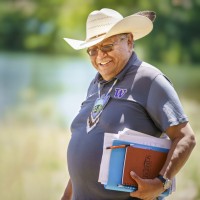An Interview with Davis/Yellowash Washines

Davis/Yellowash Washines dedicates his life to protecting the welfare of the Confederated Tribes and Bands of the Yakama Nation (Yakama Nation), the Yakama people and the rights guaranteed to them by the U.S.-Yakama Treaty of 1855. As the government affairs liaison in Yakama Nation’s Fisheries Program Superfund Section, Davis has been instrumental in advancing the Tribe’s decade-long effort to hold the U.S. government accountable for cleanup of Bradford Island, located near Bonneville Dam, and the surrounding waters of the Columbia River. Columbia Riverkeeper is honored to partner with Yakama Nation on threats facing the Columbia River, including the campaign to clean up Bradford Island and surrounding waters.
Let’s start at the water’s edge, on Bradford Island. Why did Yakama Nation prioritize advocating for clean up of the island and surrounding waters?
The history of this land, of the Columbia River—to us Native people it's called Nch'i-Wána—is the history of the people of Yakama Nation. Our history, through thousands of years of oral tradition, teaches us of our connection to Nch'i- Wána, the land, the natural resources. I hope to impart how important the Bradford Island area, and all of our other areas, are to us.
In the beginning, since time immemorial, we have had a sacred relationship between our people, the salmon, and the Columbia River. This sacred relationship is based on the sacrifice that the salmon made for us at the beginning of time. They are the first to be served at all of our feasts and all of our important ceremonial meals, in recognition of their sacrifice and their willingness to be a part of our way of life.
Among my relatives and friends, I’m known as Yellowash of the Klickitat Tribe. The Tribe is one of the fourteen signers to the U.S.-Yakama Treaty of 1855 that guarantees our Tribe’s usual and accustomed fishing places. Bradford Island and the surrounding area is what we call a usual and accustomed fishing place, used since time immemorial. Article 3 of our treaty says that we reserve the right to fish and gather at all usual and accustomed areas. This includes the right to have safe, toxic-free fish, so the water has to be safe and toxic-free. Bradford, for so long, has not been toxic-free.
One of our responsibilities is to speak for those that can't speak for themselves: the salmon, and the fish, and the natural resources. If we’re honest, they are speaking to us—if we would only listen. They are telling us that something is wrong because they have to travel through the toxic waters near Bradford.
For over 35 years, you worked as a Yakama Tribal police officer and chief of police, and later the chief of police for the Columbia River Inter-Tribal Fish Commission. How does your background in law enforcement influence your perspectives on toxic pollution in the Columbia River?
A criminal act occurred at Bradford Island, by the U.S. Army Corps of Engineers, that created a toxic site. The evidence is there, the motive is there, the opportunity for them to dump that waste is there. We need to deal with these types of acts, to hold them accountable, to hold them responsible.
Let's review what, in my opinion, is the scene of the crime. Here you have the Columbia River before and after the construction of the Bonneville Dam.
Bonneville Dam construction started in June of 1934 and it was completed in 1937. This depicts what was typical in all the areas where these dams were built on the Columbia River and the Snake River, and how they changed the landscape.
These changes were very, very harmful to Yakama Nation in terms of how they affected not only the water, but also the salmon and the other natural resources that live in the water.
Who are the victims? First of all, it's the water. In our way of belief we understand that water is life. The other victims are the things that rely on the water: the fish, the salmon, and all the other natural resources. And then us humans, especially members of Yakama Nation who revere the salmon as one of our First Foods, and our neighbors who also rely on the resources.
Yes, the Bradford Island toxic waste dump is a crime scene. Environmental laws are being broken. The historical, cultural, and spiritual significance of places like the Bradford Island area for members of Yakama Nation is enormous, as it has been since time immemorial.
In March 2022, the U.S. Environmental Protection Agency officially designated a new Superfund cleanup site on the Columbia River: Bradford Island and surrounding waters. What is your take on this monumental achievement?
I’m glad Bradford is finally a Superfund site. I hope to bring awareness to everyone about the danger of having this toxic waste dump in the Columbia. As our elders said, “We never give up.” And we, along with Columbia Riverkeeper, are going to continue to do what we feel is the responsible thing to do.
It’s not just for us, it’s for our children, our grandchildren, they’re the ones relying on us. Our goal: clean, healthy fish that is safe to eat.
The Columbia River, Bradford Island, and its surrounding areas are part of the Yakama history, culture, and people. Yakama Nation will continue to participate in and oversee the cleanup efforts at the Bradford Island site to ensure that our waters and lands are protected and restored.


